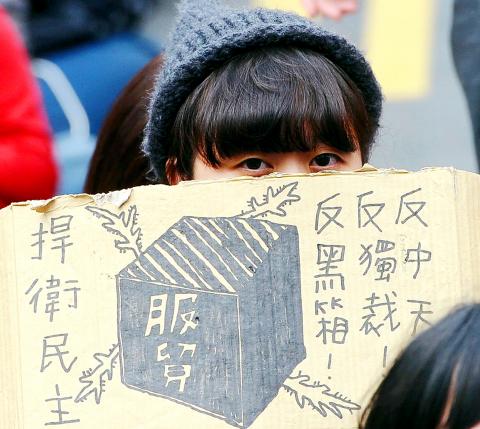The mobilization of tens of thousands against the cross-strait service trade agreement is “a grave” national matter that President Ma Ying-jeou (馬英九) must face by holding a dialogue with the protesters to find a solution, former president Lee Teng-hui (李登輝) said yesterday.
Lee called on Ma to sit down with the student-led activists, who yesterday entered the fifth day of their occupation of the Legislative Yuan in Taipei, to listen to what they have to say about the pact and understand what they want the government to do so they can end the protest and go home as soon as possible.
“This is a grave matter for the country and the president needs to take it seriously,” Lee said.

Photo: Wang Min-wei, Taipei Times
Lee made the remarks in response to media inquiries about the Chinese Nationalist Party (KMT) on Monday sending the controversial pact to a plenary session even though it has not completed the committee-level stage of the review process.
The former president told reporters yesterday that he would have handled the protest movement differently than Ma has if he were still in charge.
During the Wild Lily (野百合學運) student movement in 1991 that culminated in legislative reforms, Lee met with the then-protest leaders on March 21 to listen to their views about political reform.
“People should not call the young people taking part in the pact protest ‘mobsters’ because they are voicing their views and they care about the country’s future,” Lee said.
He added that Legislative Speaker Wang Jin-pyng (王金平) had done the right thing by not attending a meeting on Friday that Ma called by evoking Article 44 of the Constitution to discuss the issue with Wang and Premier Jiang Yi-huah (江宜樺).
“Ma was trying to shirk his responsibility to resolve the issue by passing it on to Wang,” Lee said.
Earlier yesterday, the Presidential Office said in a statement that Ma would not accept the protesters’ demand that he engage with them in a talk about the service trade pact.
The statement said Ma has always been willing to talk to groups representing all interests in a peaceful, rational manner, but that he found the students forcefully occupying the legislative chamber and then using the sit-in as leverage to demand a talk with the president to be unacceptable.
Ma had been scheduled to visit a business in Greater Tainan yesterday, as well as attend an annual event held by civic group Life Line International, but the appointments were canceled and he made no public appearances yesterday.

NATIONAL SECURITY THREAT: An official said that Guan Guan’s comments had gone beyond the threshold of free speech, as she advocated for the destruction of the ROC China-born media influencer Guan Guan’s (關關) residency permit has been revoked for repeatedly posting pro-China content that threatens national security, the National Immigration Agency said yesterday. Guan Guan has said many controversial things in her videos posted to Douyin (抖音), including “the red flag will soon be painted all over Taiwan” and “Taiwan is an inseparable part of China,” while expressing hope for expedited “reunification.” The agency received multiple reports alleging that Guan Guan had advocated for armed reunification last year. After investigating, the agency last month issued a notice requiring her to appear and account for her actions. Guan Guan appeared as required,

A Vietnamese migrant worker yesterday won NT$12 million (US$379,627) on a Lunar New Year scratch card in Kaohsiung as part of Taiwan Lottery Co’s (台灣彩券) “NT$12 Million Grand Fortune” (1200萬大吉利) game. The man was the first top-prize winner of the new game launched on Jan. 6 to mark the Lunar New Year. Three Vietnamese migrant workers visited a Taiwan Lottery shop on Xinyue Street in Kaohsiung’s Gangshan District (崗山), a store representative said. The player bought multiple tickets and, after winning nothing, held the final lottery ticket in one hand and rubbed the store’s statue of the Maitreya Buddha’s belly with the other,

‘NATO-PLUS’: ‘Our strategic partners in the Indo-Pacific are facing increasing aggression by the Chinese Communist Party,’ US Representative Rob Wittman said The US House of Representatives on Monday released its version of the Consolidated Appropriations Act, which includes US$1.15 billion to support security cooperation with Taiwan. The omnibus act, covering US$1.2 trillion of spending, allocates US$1 billion for the Taiwan Security Cooperation Initiative, as well as US$150 million for the replacement of defense articles and reimbursement of defense services provided to Taiwan. The fund allocations were based on the US National Defense Authorization Act for fiscal 2026 that was passed by the US Congress last month and authorized up to US$1 billion to the US Defense Security Cooperation Agency in support of the

DAREDEVIL: Honnold said it had always been a dream of his to climb Taipei 101, while a Netflix producer said the skyscraper was ‘a real icon of this country’ US climber Alex Honnold yesterday took on Taiwan’s tallest building, becoming the first person to scale Taipei 101 without a rope, harness or safety net. Hundreds of spectators gathered at the base of the 101-story skyscraper to watch Honnold, 40, embark on his daredevil feat, which was also broadcast live on Netflix. Dressed in a red T-shirt and yellow custom-made climbing shoes, Honnold swiftly moved up the southeast face of the glass and steel building. At one point, he stepped onto a platform midway up to wave down at fans and onlookers who were taking photos. People watching from inside